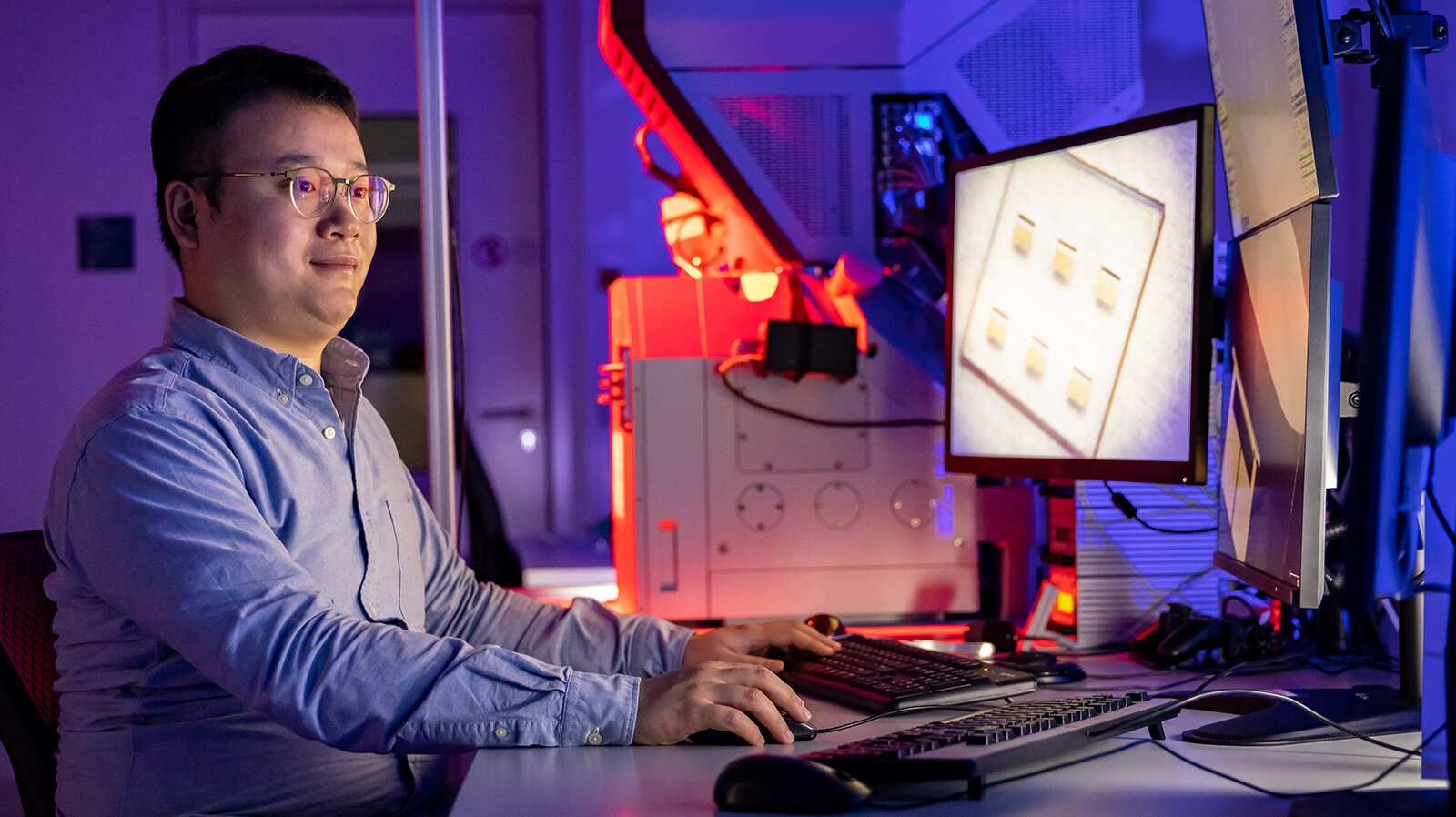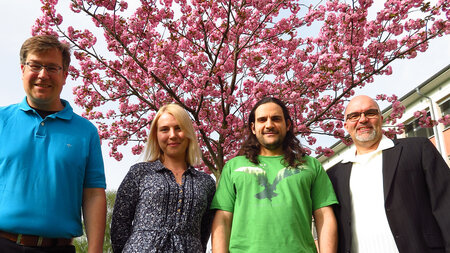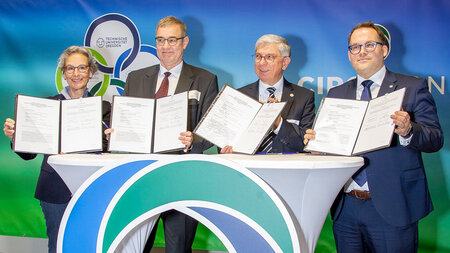First ERC Starting Grant acquired for Chemnitz University of Technology: Nano-researcher receives most important EU funding for young scientists for research project in the field of Smart Dust
Dr. Minshen Zhu from Prof. Dr. Oliver G. Schmidt’s research group positioned himself in the top field among 4.000 applications and receives one of the most prestigious research grants endowed with 1.5 million euro for his groundbreaking ideas towards the energy supply of autonomously operating microsystems.
-

Dr. Minshen Zhu won the first ERC Starting Grant at Chemnitz University of Technology for his excellent research project in the field of "Smart Dust". Photo: Jacob Müller
The European Research Council (ERC) announced the ERC Starting Grant for the first time in 2021 as part of the new Horizon Europe program. Only exceptionally innovative and excellent research ideas from young scientists are funded by an ERC Starting Grant. Among those funded in the current round of calls is Dr. Minshen Zhu. He will start his ERC-funded project at the Center for Materials, Architectures and Integration of Nanomembranes (MAIN) at Chemnitz University of Technology on February 1, 2022, in close collaboration with Prof. Dr. Oliver G. Schmidt, who holds the professorship for Material Systems of Nanoelectronics and is the designated scientific director of the Center for Materials, Architectures and Integration of Nanomembranes (MAIN) at Chemnitz University of Technology.
With his outstanding research project entitled "Smart Dust Batteries Integrated with Near-Zero-Power Surveillance" (SMADBINS), Minshen Zhu is one of only 397 out of more than 4.000 applications, who was positively reviewed by the ERC evaluation panels. With the approval, the first ever ERC Grant was acquired at Chemnitz University of Technology.
"We are extremely pleased that with Dr. Zhu, Chemnitz University of Technology has not only been able to attract an internationally outstanding young scientist, but also, thanks to his great success in the 'Horizon Europe' program, received an ERC Starting Grant for the first time in its history - one of the most prestigious EU research grants. This underlines the international research excellence of our university - both in the field of cutting-edge research and in the field of young scientists. I congratulate Dr. Zhu as well as Prof. Dr. Oliver G. Schmidt, his scientific mentor, very warmly on this great success", said Prof. Dr. Gerd Strohmeier, President of Chemnitz University of Technology.
Dr. Minshen Zhu has already been working successfully in the field of battery research for several years in Prof. Schmidt's research group at the Leibniz Institute for Solid State and Materials Research (IFW) Dresden before starting at Chemnitz University of Technology: "With Minshen Zhu, we are gaining an absolute top expert in nanotechnology and battery research," Prof. Oliver G. Schmidt is pleased to say and is certain that with the acquisition of the first European ERC Grant for Chemnitz University of Technology, the scientific excellence at the MAIN Research Center can be consistently expanded on an international level.
"The ERC grant will provide sufficient resources to address the challenges of integrating high-performance battery materials into microfabrication procedures and parallel production of on-chip tiny batteries ready for integration in smart dust. The MAIN Research Center has a full range of state-of-the-art research facilities and microsystems talents to help me clear the hurdles of developing high-energy batteries that can be mass-produced and integrable in tiny systems", Dr. Zhu says.
Within the scope of his project, Zhu wants to develop tiny batteries for so-called Smart Dust applications, which provide the energy for intelligent microsystems and microrobots operating in many different environments. Such a battery, many times smaller than a millimeter in diameter, currently does not exist. As part of the ERC project, Zhu plans to transfer techniques from conventional battery manufacturing to the micro- and nanometer scale and wind extremely thin layer systems into tiny cylindrical batteries on a microchip surface. This project thus fits perfectly into the scientific scope of the MAIN Research Center at Chemnitz University of Technology, which is unique in Europe and takes a leading international role in the research and development of flexible nanomembrane materials.
Background: ERC top funding for Smart Dust technology
Smart Dust is one of the most promising future technologies in micro- and nanoelectronics. Smart Dust is expected to take on a multitude of previously unachievable tasks, especially in using and monitoring industrial plants, machines and agricultural areas as well as in civil protection and disaster control, but also in medicine and health care. Particularly visionary are diagnostics and treatments in the human body, such as the close monitoring of organ functions.
In order for these microelectronic systems to work autonomously and continuously, a stable energy supply is necessary. However, the independent and integrated energy supply of such a microelectronic system by means of a battery is still one of the unresolved tasks. A particular challenge is that conventional battery types such as lithium-ion batteries cannot be used on such a small scale. Instead, completely new battery types need to be explored, ideally integrated directly into the system from the very start.
The goal of the project, which was awarded Dr. Minshen Zhu and funded with an ERC Starting Grant of 1.5 million euro, is to develop such an "on-chip battery." Dr. Zhu and Prof. Schmidt already published initial considerations in this direction last year in the prestigious scientific journal Nature.
Background: ERC Starting Grant 2022
Grants from the European Research Council (ERC) are awarded only to particularly outstanding research ideas and scientists. For the current funding round, which was announced for the first time as part of the Horizon Europe program, 4,000 applications were received. Of these, only 397 were approved, 72 of which came from Germany, including the application submitted by Dr. Minshen Zhu. The funding certifies the excellence of the grantees' project and is proof that they are among the best in their field.
About Dr. Minshen Zhu
Minshen Zhu studied material science and engineering at Beijing University of Chemical Technology and City University of Hong Kong. In 2017, Zhu received his PhD from City University of Hong Kong and subsequently joined Prof. Oliver G. Schmidt's group at Leibniz IFW Dresden. Dr. Zhu was listed in 2020 and 2021 as world's top two percent Scientist most cited researchers within his field by Stanford University.
(Author: Matthias Fejes / Translation: Chelsea Burris)
Matthias Fejes
10.01.2022





